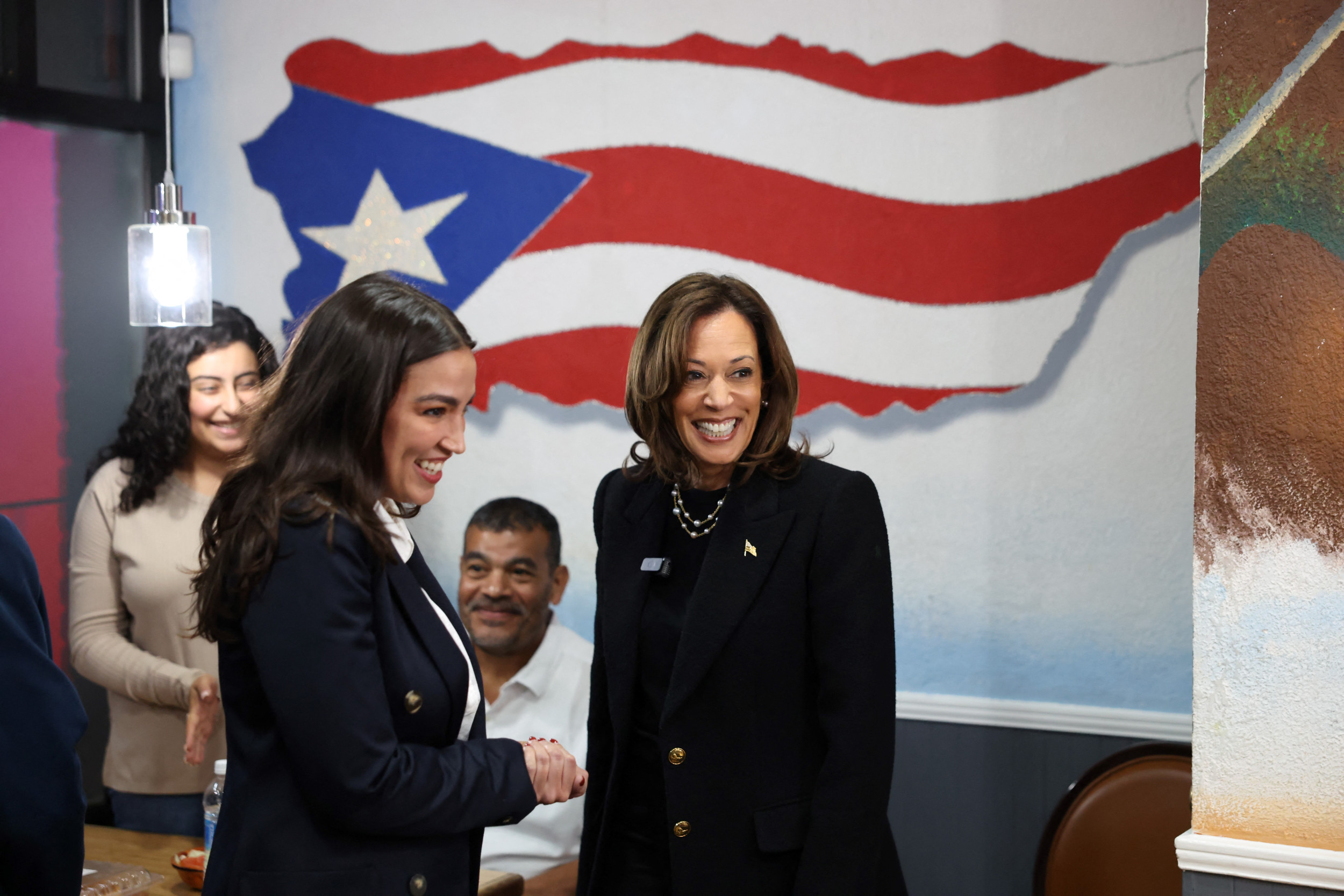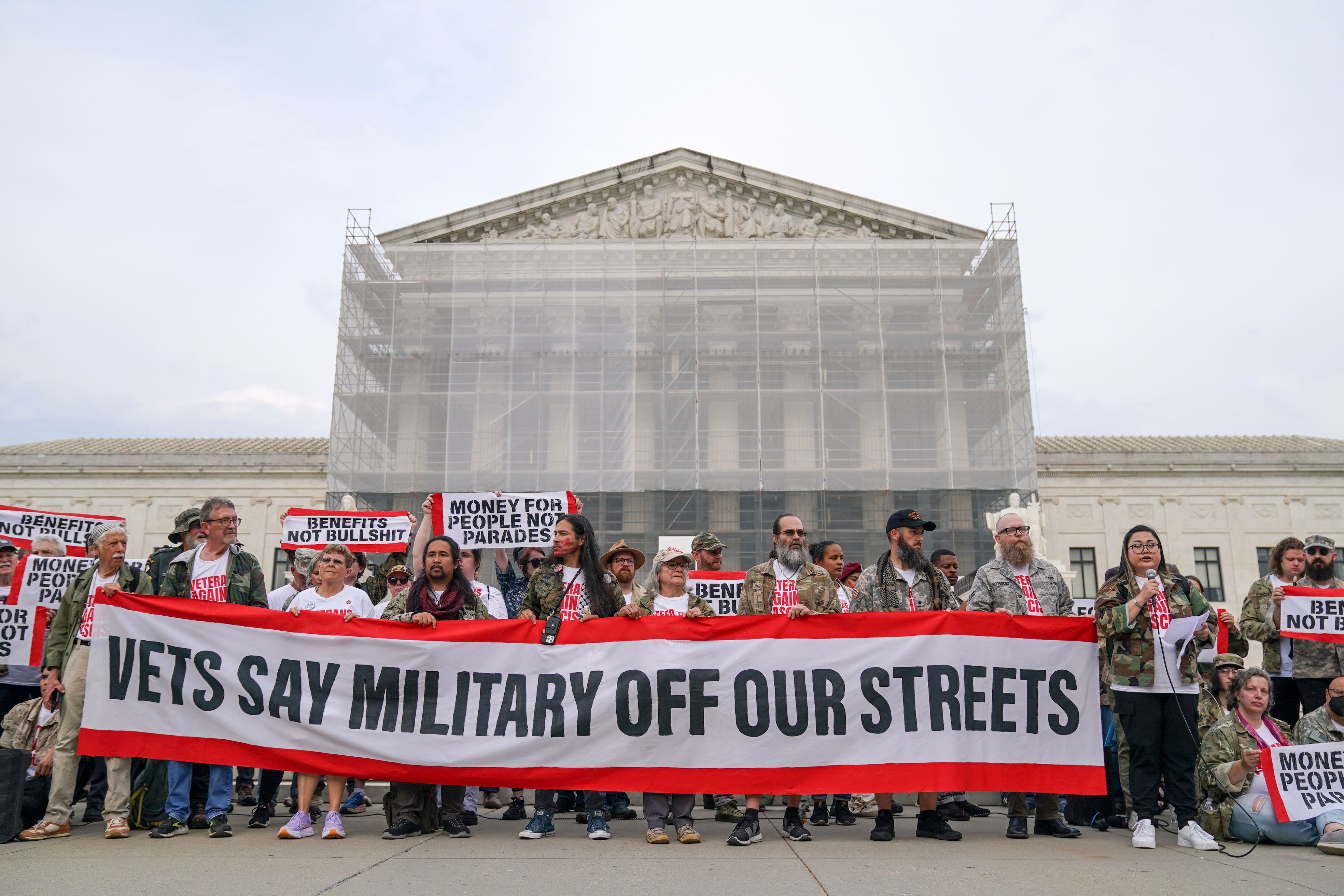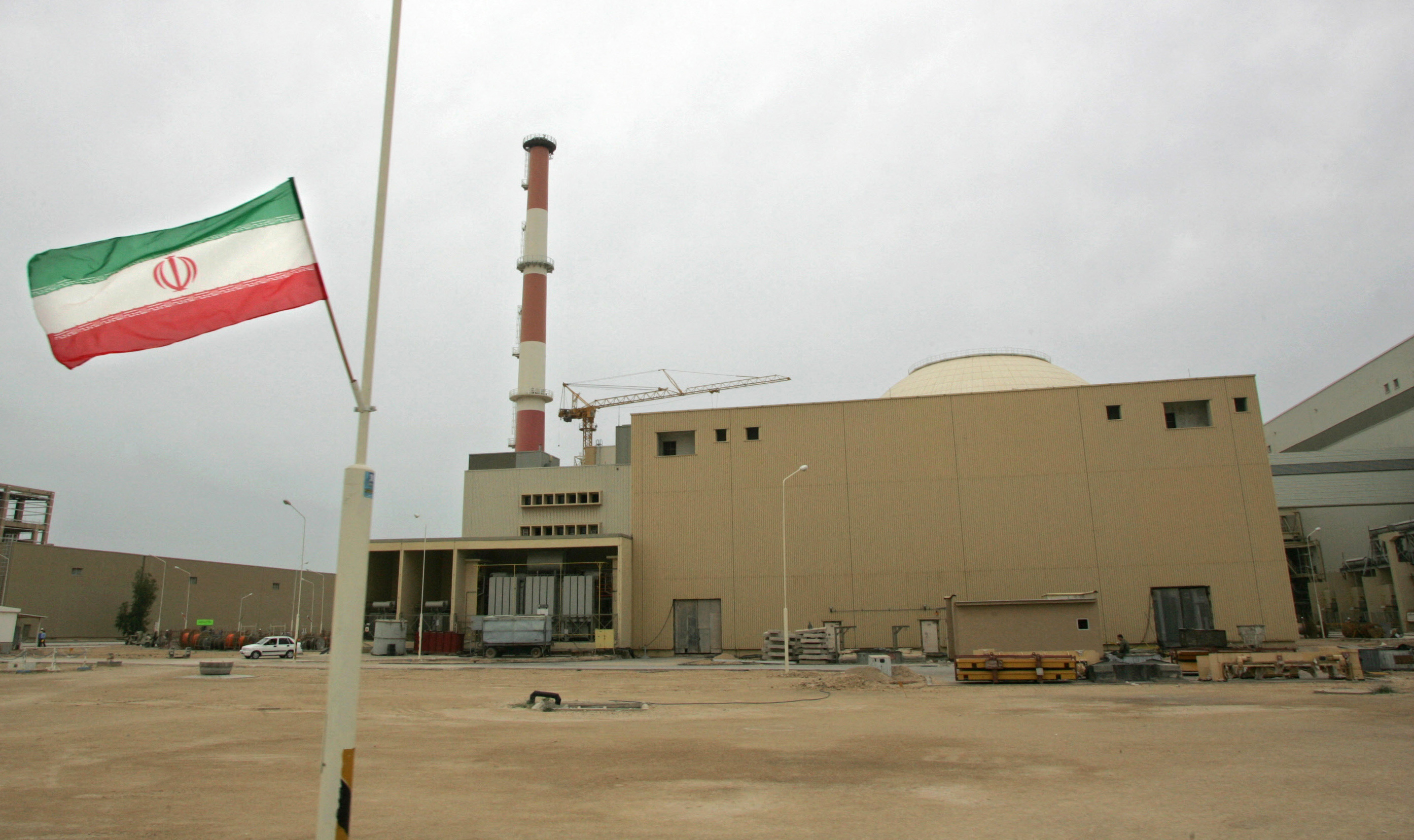🎙️ Voice is AI-generated. Inconsistencies may occur.
Senator Bernie Sanders said Tuesday he plans to introduce legislation that aligns with President Donald Trump's recent executive order to lower prescription drug prices. The announcement came during Sanders' remarks at the second congressional hearing with independent presidential candidate Robert F. Kennedy Jr.
What to know:
- Sanders, the top Democrat on the Senate Health, Education, Labor, and Pensions Committee, voiced support for Trump's executive order despite doubts that it will survive legal challenges.
- He said legislative action is more reliable and intends to introduce a bill with similar goals.
- Sanders invited both Kennedy and Trump to work with him on the legislation.
- Kennedy said he would be open to collaborating with Congress to reduce drug costs.
This live blog is now closed.
AOC's chances of leading Democrats compared to Kamala Harris: Poll

A new poll shows that there is no clear consensus among likely voters for who the next face of the Democratic Party will be. However, New York Representative Alexandria Ocasio-Cortez has emerged as the frontrunner over former Vice President Kamala Harris.
Newsweek reached out to the Democratic National Committee (DNC) via online form Wednesday for comment.
Democrats have seemingly been in disarray since losing the White House, Senate and Congress after the election. Uproar over certain policies and uncertainty about which figureheads to get behind within the party have frayed internal cohesion.
It is unclear whom the party will rally behind, as polling shows former Vice President Kamala Harris has most recently led the pack of potential presidential candidates, followed by Ocasio-Cortez, California Governor Gavin Newsom and former Transportation Secretary Pete Buttigieg.
Since leaving office after President Donald Trump's January inauguration, Harris has kept a somewhat low political profile as rumors swirl about her potential future in federal or state politics.
Ocasio-Cortez, however, has hit the trail across America, attempting to rally grassroots communities within the party to get reenergized about the Democratic movement following the election loss.
Trump urges Iran to choose diplomacy over violence in nuclear talks
President Donald Trump on Wednesday emphasized his preference for a peaceful resolution in ongoing nuclear negotiations with Iran, urging Iranian leaders to move forward with a deal. At a state dinner in Doha, Qatar, Trump described the talks as having only two potential paths — one friendly and one violent.
"There's a friendly and a non-friendly, and non-friendly is a violent course, and I don't want that," Trump said. "But they have to get moving."
The U.S. has been in active negotiations with Iran for several weeks, with special envoy Steve Witkoff leading the American delegation during the president's visit to Qatar. While both nations have agreed to continue talks, Trump has offered few public details on what the final agreement should include, aside from a firm stance that Iran must not obtain a nuclear weapon.
Kennedy faces criticism over deep cuts and policy changes at HHS
U.S. Health and Human Services Secretary Robert F. Kennedy Jr. has come under fire from both Republicans and Democrats for sweeping staffing reductions, research funding freezes, and policy changes since taking the helm of the department. During back-to-back hearings on Wednesday before the Senate's health committee and the House appropriations committee, Kennedy defended the White House's proposed budget for his agency, which includes cuts to infectious disease prevention, medical research, and maternal health programs, while pushing a $500 million boost for his "Make America Healthy Again" initiative.
Kennedy explained that his decision to reduce the department's workforce from 82,000 to 62,000 employees was a necessary cost-cutting measure to eliminate redundancies, particularly in offices related to women's health, minority health, and STD prevention. However, his approach was met with concern from Democrats, who argued that the cuts would harm critical health initiatives such as overdose prevention, cancer treatments, and heating assistance for low-income families.
One key area of debate was the proposed nearly $20 billion cut to the National Institutes of Health (NIH). Democratic lawmakers, including Sen. Patty Murray, raised concerns that these cuts would delay treatments for patients like Natalie, a mother with stage 4 cancer, while Kennedy struggled to provide details on the number of jobs lost at NIH.
Kennedy also defended the decision to eliminate funding for the Low-Income Home Energy Assistance Program (LIHEAP), but the move was met with resistance from Republicans like Sen. Lisa Murkowski of Alaska, who warned that the cuts would hurt those who rely on energy assistance in colder states.
While some Republicans praised Kennedy's focus on healthy eating, concerns were raised over other policies, including his stance on artificial food dyes and fluoride recommendations for drinking water. Additionally, Kennedy faced criticism from both sides for his controversial statements on vaccines, with health experts arguing that his comments are exacerbating a measles outbreak in several states.
As Kennedy faces growing pushback, his leadership at HHS remains a contentious issue in Washington.
Newsom's budget proposal includes freeze on immigrant health care
California Governor Gavin Newsom has proposed freezing enrollment in the state-funded health care program for immigrants living in California without legal status to close a $12 billion budget deficit. This proposal is part of his nearly $322 billion spending plan for the upcoming fiscal year.
Newsom attributed the deficit to rising Medicaid spending, economic uncertainty, and the impact of federal tariff policies, notably blaming President Donald Trump's policies for reducing state revenues by as much as $16 billion in the coming years.
The freeze on health care enrollment would apply to low-income adults without legal status starting in 2026. While those already enrolled will not lose coverage, the change also introduces a $100 monthly premium for adults with unsatisfactory immigration status beginning in 2027. The proposed changes are expected to save the state $5.4 billion by 2028-2029.
While Newsom defended his actions, highlighting California's commitment to immigrants, some lawmakers, including Republican Assembly Leader James Gallagher, criticized the governor for his spending. Democratic leaders, such as Senator Dave Cortese, opposed scaling back health care coverage for immigrants, arguing that it goes against California's values.
Republicans divided over Trump's healthcare bill
As President Donald Trump continues his Middle East trip, several Republican hardliners strongly oppose the House's current version of his proposed healthcare bill. They argue that the legislation does not do enough to reform Medicaid or reduce the deficit, creating a challenge for House Speaker Mike Johnson in uniting differing factions of his conference.
Rep. Eric Burlison expressed concerns about the bill's potential to increase the deficit, stating that he could not support it without changes. Rep. Chip Roy also predicted significant resistance, particularly over Medicaid provisions, which he argues are insufficiently reformed. Roy criticized the bill for adding more state and local tax (SALT) money, further complicating efforts to reach consensus.
Rep. Ralph Norman, another bill critic, stated that the current version was unlikely to pass without significant revisions, particularly to Medicaid work requirements. As Republicans remain divided, Speaker Johnson faces a tough road ahead to secure enough votes for the legislation's passage.
Georgetown scholar released after wrongful arrest under Trump's crackdown
Badar Khan Suri, a Georgetown scholar from India, was released from immigration detention Wednesday following a federal judge's ruling. Immigration authorities had detained Suri under the Trump administration's crackdown on foreign students, particularly those involved in campus protests over the Israel-Hamas conflict.
Suri, who had been held in Texas, will return to his family in Virginia while he fights deportation proceedings and challenges his wrongful arrest. The U.S. government had accused Suri of supporting Hamas, which it designates as a terrorist group, based on his social media posts and his wife's Palestinian American background.
U.S. District Judge Patricia Tolliver Giles granted Suri's release, noting the substantial constitutional claims against the Trump administration and the likely First Amendment protection of his speech. She emphasized that the First Amendment protects all individuals, regardless of citizenship, and that Suri was likely engaged in protected political speech.
Suri's case, which drew widespread criticism from civil liberties groups, highlights concerns about the government's targeting individuals based on political views. His attorneys from the ACLU argued that no one should be detained for their ideas, underscoring the importance of protecting First Amendment rights.
Hawley, Kennedy back bill to end pharma ad tax breaks
Sen. Josh Hawley, R-Mo., said Tuesday he is introducing bipartisan, bicameral legislation to repeal the tax deductibility of pharmaceutical advertising costs.
Under current law, drug companies can write off advertising as a business expense. Hawley's bill would eliminate that benefit.
Independent presidential candidate Robert F. Kennedy Jr. said he "100%" supports the measure and has discussed the issue with Treasury Secretary Scott Bessent.
"We expect to come out with a policy within the next few weeks," Kennedy said.
Boeing lands $96 billion Qatar deal during Trump visit
Boeing has secured two major aircraft orders in the Middle East, including a record $96 billion deal with Qatar, as President Donald Trump tours the region. The agreement, which covers Boeing's 787 and 777X wide-body jets, marks the most significant order in the company's history, according to Boeing.
"That's pretty good," Trump said during the announcement. "Get those planes out there."
The Qatar deal follows a separate order from a Saudi company for 20 737-8 jets, with options for 10 more. Both moves signal renewed momentum for Boeing, which has recently faced intense scrutiny and financial losses.
The announcements come just days after China lifted a freeze on Boeing plane deliveries as part of a U.S. trade deal, further boosting the company's outlook.
Still, controversy swirled as Trump accepted a luxury Boeing 747-8 from Qatar's ruling family—a gesture critics say could violate constitutional rules against foreign gifts and pose security risks.
Boeing stock hit a 12-month high Wednesday, buoyed by the news and continuing a five-day rally.
RFK Jr. acknowledges proposed NIH cuts will 'hurt': watch
"I think the cuts that are now proposed by NIH are gonna hurt" -- RFK Jr admits that NIH cuts will hurt people pic.twitter.com/nyiTBt7IBW
— Aaron Rupar (@atrupar) May 14, 2025
Lawmakers from both parties on Wednesday expressed concern over the sweeping staffing reductions, research funding freezes, and significant policy shifts implemented by U.S. Health and Human Services Secretary Robert F. Kennedy Jr. during his brief tenure leading the department.
As Kennedy defended the White House's requested budget for his agency, he told Senator Patty Murray of Washington that proposed cuts to the National Institute of Health (NIH) would "hurt."
Kennedy replied to a question about the cuts, saying in part, "I think the cuts that are now proposed by NIH are going to hurt," he replied during a tense exchange. "There's no agency head in the government, like myself, who wants to see their budget cut."
Trump meets Syria's new leader, a former al-Qaida fighter once detained by the U.S.
Trump met Wednesday with Syria's new leader, Ahmad al-Sharaa, a former al-Qaida fighter once held by the U.S. military and previously listed with a $10 million bounty on his head. The meeting, facilitated by Saudi and Turkish leaders, marked a dramatic shift in al-Sharaa's path from jihadi insurgent to head of state.
Trump praised al-Sharaa as a "young, attractive guy" with a "very strong past" and pledged to lift U.S. sanctions imposed on the government of deposed Syrian President Bashar Assad. Al-Sharaa, who led the insurgency that toppled Assad in December, has promised to chart a new course for Syria after more than a decade of war.
Known in the past as Abu Mohammed al-Golani, al-Sharaa once led al-Qaida's branch in Syria. Over the years, he rebranded the group and distanced it from its terrorist roots, eventually gaining support from key regional powers. The U.S. lifted its terror designation after he took power, and Wednesday's handshake with Trump was seen as symbolic recognition of his new role.
Still, al-Sharaa faces enormous hurdles. The Syrian economy is shattered, much of the country lies in ruins, and recent sectarian violence has reignited fears of instability. An Israeli military campaign in southern Syria and simmering tensions among ethnic groups have also tested his early leadership.
Despite the challenges, Trump expressed cautious optimism. "They have a lot of work to do," he said, "but he's got a real shot."
White House claims $1.2 trillion agreement with Qatar, offers no proof
The White House announced Tuesday that President Donald Trump has signed an agreement with Qatar valued at more than $1.2 trillion, though it did not release any documentation to support the figure.
NBC News reported it could not independently verify the accuracy of the claim. In a statement, the White House also touted more than $243.5 billion in economic deals, including a major sale of Boeing aircraft and GE Aerospace engines to Qatar Airways.
Trump is currently visiting Qatar as part of his first foreign trip since beginning his second term.
Judge blocks Trump order stripping Foreign Service union rights—for now
A federal judge on Wednesday temporarily blocked the Trump administration from enforcing part of an executive order that would strip Foreign Service employees of their collective bargaining rights.
U.S. District Judge Paul Friedman granted the American Foreign Service Association's request for a preliminary injunction while the union's lawsuit against the administration moves forward. The union, representing over 18,000 Foreign Service employees, argued that President Trump's March 27 order unlawfully removed bargaining protections at the State Department and U.S. Agency for International Development.
Union attorneys said the move was retaliatory and not about national security, as the administration claimed. Government lawyers argued Trump had the authority to act in the public interest and remove restrictive labor agreements from national security-focused agencies.
Friedman previously halted a similar order affecting federal workers in other departments. His latest ruling keeps union protections in place for now, though the administration is appealing past decisions.
Newsom plans to freeze new Medi-Cal signups for undocumented adults in 2026
California Gov. Gavin Newsom proposes to freeze enrollment for low-income immigrants without legal status in the state's Medi-Cal program beginning in 2026, followed by new monthly premiums for existing enrollees starting in 2027.
The change comes as the state grapples with budget pressure and a growing price tag for the health care expansion. Newsom said the program cost $2.7 billion more than expected on Wednesday and blamed additional strain on rising pharmacy costs, wildfire recovery, and tariff policies that have reduced tax revenue.
Starting in 2027, undocumented adults and others with "unsatisfactory immigration status" already enrolled in Medi-Cal would have to pay $100 per month. The changes do not affect children, and current enrollees will not lose coverage under the freeze.
The move is expected to save the state $5.4 billion by 2029, but has sparked backlash from immigrant advocates. "The proposal just doesn't match with our values as a state," said Masih Fouladi of the California Immigrant Policy Center.
Trump admires Gulf opulence, eyes presidential upgrades during Middle East trip
During his visit to the Middle East this week, President Donald Trump openly admired the luxury and modern design of his Arab hosts' surroundings, while lamenting what he sees as America's outdated presidential tools.
From marveling at Qatar's "perfecto" marble to praising Saudi Arabia's skyline, Trump repeatedly contrasted the Gulf states' glitz with what he called a "much smaller" and "less impressive" Air Force One. He even floated the idea of accepting a Boeing 747 donated by Qatar, despite potential security concerns and constitutional issues around accepting foreign gifts.
The president, known for his lavish tastes, appeared drawn to the region's grandeur. In Qatar, he told Emir Tamim bin Hamad Al Thani, "This is what they call perfecto," referring to the palace marble. He complimented gold swords, camelback greetings, and fighter jet escorts elsewhere.
The trip seems to have renewed Trump's interest in revamping U.S. presidential aesthetics. He's proposed replacing state dinner tents with a $100 million Mar-a-Lago-style ballroom at the White House and even redesigning the Rose Garden with stone paving. Gold accents and a custom Air Force One model have already been added in the Oval Office.
"We've outgrown the tent stuff," Trump recently said, continuing his push to reshape the presidency in his own extravagant image.
Democrat says she's 'horrified' RFK Jr. won't encourage vaccinations of kids
Rep. Rosa DeLauro, the top Democrat on the House Appropriations Committee, expressed outrage Wednesday over Health and Human Services Secretary Robert F. Kennedy Jr.'s refusal to encourage childhood vaccinations for measles, chickenpox, and polio.
"I'm horrified," DeLauro said in her closing remarks at a budget hearing. "Vaccines save lives, and the fact that the secretary of Health and Human Services refuses to encourage children to be vaccinated is a tragedy."
DeLauro pointed to two recent measles-related deaths in the U.S. and warned that public health is at risk if vaccine uptake continues to drop.
She also criticized the administration's budget plans, accusing it of trying to illegally block funding for the National Institutes of Health and proposing a $20 billion cut in 2026. "The havoc that we are going to cause in dealing with research is going to put lives at risk," she said.
Super Micro Computer jumps after Saudi data center deal
Super Micro Computer shares climbed 12.7% on Wednesday following a new partnership with Saudi Arabian data center firm DataVolt. The deal signals expansion opportunities for Super Micro in the Middle East and strengthens its presence in the global server market.
Meanwhile, the S&P 500 index has recovered all its earlier losses since President Donald Trump escalated his global trade war. The index now sits just 4.2% below its all-time high from February.
Despite Trump delaying some of the harshest tariffs, businesses and consumers remain wary. Ongoing uncertainty and unpredictable trade moves have made it difficult for companies to plan and consumers to spend confidently.
ICE agents abandon child on street after arresting adult, video shows
A child was reportedly left alone on the street during a federal immigration operation in Waltham, Massachusetts, earlier this month, a city official said.
Newsweek has contacted the Department of Homeland Security for comment.
President Donald Trump has made sweeping immigration changes since returning to office in January as he directs his administration to remove millions of undocumented immigrants under his flagship mass deportation policy. The White House has said anyone living in the country illegally is a criminal and has moved to revoke the temporary legal status of hundreds of thousands of migrants. Critics say increased immigration enforcement actions are sowing fear in migrant communities.
**Johnson distances himself from Trump's potential Qatar jet deal**
House Speaker Mike Johnson declined to comment Wednesday on Donald Trump's reported plans to accept a free plane from Qatar to replace Air Force One, saying the issue is outside his responsibilities.
"It's not my lane," Johnson said during a news conference. He later added that he doesn't believe the emoluments clause would apply in this case, since the aircraft would be a personal gift to the country rather than to Trump.
Johnson said he hasn't been closely following the matter, noting his current focus is on passing a budget reconciliation bill.
Trump's move to ease Syria sanctions could aid recovery, but timeline is uncertain
Trump's announcement that the U.S. will ease sanctions on Syria could mark the start of the country's economic recovery after years of civil war. However, experts caution that progress will be slow and the path will be unclear.
Sanctions on Syria have been in place for decades, beginning in 1979 when the country was labeled a sponsor of terrorism. Later measures, including the 2003 Syria Accountability Act and the 2019 Caesar Act, targeted the Assad regime's military actions, human rights abuses, and support for armed groups.
While the easing of sanctions has already prompted celebrations in Syria and support from regional leaders, economists say real change will depend on how much relief is offered. Syria desperately needs investment to rebuild infrastructure and reduce widespread poverty.
Sanctions have severely restricted the Syrian economy, affecting everything from imports to humanitarian aid. Even temporary exemptions, like those issued after the 2023 earthquake, have had limited effect due to over-compliance by global banks and businesses.
Trump's pledge has raised hopes that Syria may rejoin the global financial system and attract reconstruction funding. But full recovery will depend on removing multiple layers of restrictions — a process that is likely to take time.
Republican falls asleep during early morning vote
A Republican member of Congress had to be woken up after taking a "quick power nap," as he described it to Newsweek, during an early-morning committee markup on Wednesday.
The House Ways and Means Committee met for an hours-long markup meeting to discuss a sweeping reconciliation bill that would include President Donald Trump's tax cuts. During the meeting, which lasted into Wednesday morning, legislators debated and voted about whether to include specific amendments into the bill.
The legislation, if passed, could have implications for some social programs like the Supplemental Nutrition Assistance Program (SNAP). But it faces a closely divided Congress, where Republicans hold only a seven-seat majority, meaning there could only be a few defections for the bill to pass.
GOP Representative Blake Moore of Utah briefly dozed off during a vote on an amendment raised by Representative Judy Chu, a California Democrat, during the meeting.
Chu proposed an amendment that she said would protect automatic enrollment into the Affordable Care Act from a measure that would require families to manually verify their income each year. Chu argued that would hurt Americans like gig workers who cannot accurately predict their yearly income.
When it came time to vote on whether to include the amendment, Moore had fallen asleep and had to be woken up by Representative Michelle Fischbach, a Minnesota Republican, sparking laughter from other lawmakers. Moore himself joined in on the laughter before voting against the amendment.
Kennedy dodges vaccine questions, says people shouldn't take medical advice from him

Health and Human Services Secretary Robert F. Kennedy Jr. recently faced questions about vaccinating his children during a Congressional hearing. When asked if he would vaccinate his kids today for measles, he paused before stating that he would "probably" do so. However, he quickly clarified that his views on vaccines were "irrelevant," and he did not believe people should take medical advice from him.
Kennedy, a well-known anti-vaccine advocate before joining the Trump administration, declined to answer whether he would vaccinate his children for chickenpox or polio, both vaccines widely recognized as safe and effective. When pressed, he reiterated that he did not want to offer advice on the matter, emphasizing that his team's goal was to present the "pros and cons."
Kennedy has previously promoted unproven treatments for measles, including the steroid budesonide, the antibiotic clarithromycin, and cod liver oil—none of which are medically recommended for treating the disease. Experts have warned that high doses of vitamin A, often found in cod liver oil, can be harmful, especially to young children.
Trump discusses Middle East, sanctions, and more during flight gaggle
While on Air Force One, Trump met with reporters, providing insight into his recent diplomatic activities and foreign policy considerations. His comments touched on various topics, including his discussions with Syrian President Bashar al-Assad, his stance on Syria's potential joining of the Abraham Accords, and his views on the ongoing Middle East conflicts.
Trump described his meeting with Assad as positive, praising the Syrian president's strength and leadership. He also mentioned his talks with Turkish President Erdogan, calling him a supportive figure for Assad. However, Trump stated that Syria had much work to do before it could be considered for the Abraham Accords, although he believes they eventually will join.
Trump stressed that his diplomatic efforts were good for Israel regarding the Middle East, highlighting the broader benefits of his relationships with Middle Eastern countries. He acknowledged Israel's efforts in freeing hostages but emphasized the importance of U.S. involvement in the matter.
When asked about his potential participation in a meeting with Russian President Vladimir Putin, Trump suggested it could still happen, though he expressed uncertainty about Putin's attendance. Additionally, Trump addressed the topic of sanctions, hinting that secondary sanctions on Iran could be implemented if necessary to prevent Iran from acquiring nuclear weapons.
Trump also fielded questions about his family's involvement in crypto and discussed his stance on crypto leadership, stating that the U.S. must lead in the sector or risk China taking the lead. He also responded to Senator Chuck Schumer's remarks about blocking political nominees, calling Schumer's behavior increasingly erratic.
Lawmakers push back on Duffy over DOT cuts and staffing woes
Transportation Secretary Sean Duffy faced early bipartisan criticism during a House budget hearing Tuesday, as lawmakers expressed alarm over cuts to staff and programs at the Department of Transportation.
The hearing came amid mounting air travel issues, including delays and cancellations at Newark airport, which officials blame on Federal Aviation Administration staffing shortages and technology problems.
Rep. Steve Womack, R-Ark., chair of the appropriations subcommittee, warned against restructuring the department or withholding funds without congressional oversight. "Efforts to restructure the Department of Transportation without congressional approval... concerns me," he said.
Ranking member Rep. Jim Clyburn, R-S.C., echoed the unease, citing deep concern over reduced staffing and unspent appropriations.
Trump receives rare fighter jet escort, gift offer in Qatar
On Wednesday, Trump's visit to Qatar began with an unusual show of military pageantry: a ceremonial F-15 fighter jet escort as Air Force One entered Qatari airspace. It mirrored a similar gesture from Saudi Arabia the day before, as both nations sought to impress the president during his Middle East trip.
White House aide Margo Martin posted video clips of the flights, calling the experience "what a view flying into Qatar!!!" and highlighting the rare escort as a sign of honor. One Qatari pilot even snapped a photo of Air Force One midair.
Beyond the escort, Qatar has offered Trump a luxury Boeing 747-8, potentially to serve as Air Force One while Boeing completes newer models. Trump has defended the idea as cost-effective, though critics have raised alarms over the ethical and national security implications of accepting such a gift from a foreign government.
Trump continues his regional tour on Thursday, stopping in the United Arab Emirates.
Commerce Department rescinds Biden-era limits on AI chip exports
The U.S. Department of Commerce has withdrawn a Biden-era rule that would limit exports of artificial intelligence chips to over 100 countries without federal approval. The rule, set to take effect Thursday, was reversed following complaints from the tech industry and foreign governments.
In its guidance, the department said the restrictions "would have stifled American innovation and saddled companies with burdensome new regulatory requirements."
The original framework, established by President Joe Biden before leaving office, sought to balance national security with economic interests. While existing export controls targeted countries like China and Russia, the rule would have added broader limits, including on U.S. partners in the Middle East.
Major chipmakers like Nvidia and AMD opposed the measure, warning it could push buyers toward competitors like China. Microsoft President Brad Smith told lawmakers the rule signaled to over 100 countries that the U.S. could no longer be a reliable AI supplier.
Commerce Undersecretary Jeffery Kessler said the Trump administration would craft a new export policy focusing on cooperation with trusted partners. The European Commission welcomed the reversal, saying it would help maintain strong diplomatic and economic ties with the U.S.
Iran reacts to Trump speech: 'Pure deception'

Iran's Foreign Affairs Minister has condemned U.S. President Donald Trump's recent remarks about Tehran, accusing Washington of decades of sabotage and of covering up Israeli crimes in the region.
President Donald Trump labeled Iran as the "most destructive force in the region", while on a high-profile visit to Saudi Arabia, Reuters reported.
Newsweek has reached out to the White House for comment.
Why It Matters
The remarks underscore tensions between the U.S. and Iran amid ongoing nuclear talks with Trump saying he hopes to achieve an agreement that would prevent Iran from acquiring nuclear weapons. If talks fail, he has threatened possible military action. Iran says it seeks only a peaceful nuclear program, but will defend itself against any attack.
Republicans push ahead with sweeping bill of tax cuts, spending reductions, and border security
Republicans in Congress are racing to pass a massive legislative package that includes tax breaks, spending cuts, stricter work requirements for aid programs, and a significant boost in border security funding. Dubbed "The One, Big, Beautiful Bill" in a nod to Donald Trump, the package aims to deliver on many of the president's campaign promises. House Speaker Mike Johnson hopes to pass the bill by Memorial Day.
The proposal includes more than $5 trillion in tax cuts, with offsets including cuts to clean energy credits and expanded oil and gas leasing. It would permanently extend Trump-era tax cuts and create new deductions, including for tipped wages and auto loan interest.
Other major provisions would impose stricter work rules on Medicaid and food assistance recipients, shift more SNAP costs to states, and overhaul student loan repayment options. Federal pensions would be trimmed, and development on public lands would increase.
Border security is a central focus, with $69 billion proposed for wall construction, deportations, and thousands of new immigration officers. The defense budget would rise by $150 billion, including $25 billion for a proposed missile defense shield dubbed the "Golden Dome."
Democrats have vowed to oppose the bill. House Minority Leader Hakeem Jeffries called it "extreme and toxic," while critics say it will gut safety net programs and escalate environmental rollbacks.
Trump's Middle East business ties raise new conflict of interest concerns
President Donald Trump's second-term visit to the Middle East has reignited concerns over the overlap between his family's foreign business ventures and U.S. foreign policy. As Trump tours Saudi Arabia, the UAE, and Qatar, his sons continue to expand the Trump Organization's footprint in the region, including plans for Trump Tower Dubai and new luxury projects in Saudi Arabia, Oman, and Qatar.
Critics say the Trump family's expanding business interests in the Gulf raise ethical red flags, especially given lavish gifts like a $400 million plane from Qatar and a $2 billion cryptocurrency deal linked to Trump's crypto firm, World Liberty Financial. Trump denies involvement, though he continues to profit from the brand.
The administration insists Trump is complying with conflict-of-interest laws. White House press secretary Karoline Leavitt called concerns "ridiculous," noting the president's assets are held in a trust run by his children. However, ethics experts point out that trust allows deals with private foreign companies, a key difference from Trump's first term.
Trump's itinerary itself raises questions. He chose Saudi Arabia as his first stop, citing a pledge of $600 billion in U.S. investments. The UAE has promised $1.4 trillion more over the next decade. Trump's defenders say his business success is part of his political appeal, but watchdogs warn that perceived pay-to-play diplomacy could erode public trust.
The Trump Organization's ties to Gulf leaders date back nearly two decades, with real estate moguls like Hussain Sajwani, head of DAMAC Properties, playing central roles. Trump once claimed he turned down a $2 billion deal with Sajwani, a figure now investing heavily in Trump-linked U.S. data centers.
Even some conservatives say the appearance of self-enrichment is troubling. "When he leaves the White House, the company is worth more," said AEI fellow Timothy P. Carney. "His personal wealth goes up."
Anti-Trump podcast wins major award

The MeidasTouch Podcast, a show critical of President Donald Trump, has won Podcast of the Year at the Webby Awards.
Newsweek has reached out to the makers outside of regular working hours via email for comment.
The left-leaning MeidasTouch Podcast has been dominating the podcast charts since the beginning of Trump's second term in office, after overtaking popular podcasts including former No1 Joe Rogan. It has held firm as the country's most downloaded podcast, indicating a shift in what the American people want to hear.
DNC to fly 'Qatar-a-Lago' banner over Trump's Mar-a-Lago estate
The Democratic National Committee plans to fly a banner over Donald Trump's Mar-a-Lago estate in Florida today, mocking his ties to Qatar and the Middle East. The banner, reading "Qatar-a-Lago," is scheduled to fly between 11 a.m. and 3 p.m. ET, coinciding with Trump's visit to Qatar — his first international trip of his second term.
The move follows criticism over the Trump administration's acceptance of a luxury Qatari jet for use as Air Force One. Senator Chuck Schumer has since vowed to hold up Justice Department nominees until more information is released.
Trump and his family have longstanding business interests across the Middle East, including real estate and golf ventures. In a statement, DNC Chair Ken Martin said the banner was meant to highlight Trump's alleged self-dealing.
"Trump has no loyalty to the American people, national security, or the Constitution — his only allegiance is to his bank account and his billionaire buddies," Martin said.
Trump-backed remittance tax sparks fear in Guatemalan towns dependent on U.S. money
Israel Vail, a small business owner in the Guatemalan town of Cajolá, relies entirely on his children's money from the U.S. for his livelihood. Their remittances built his home, funded his store, and kept his family afloat. But new proposals from President Donald Trump and House Republicans have stirred deep concern in communities like his.
A bill backed by House Republicans would impose a 5% tax on money transfers sent by non-citizens, including green card and visa holders. Trump has also signaled he may issue a directive to block remittances sent by undocumented immigrants entirely.
Remittances play a significant role in Guatemala's rural economy, providing jobs, housing, and education. Experts warn that taxing or restricting them could hurt the U.S. economy, fuel more migration, and force people to use unregulated channels.
Trump allies say the tax would discourage illegal immigration and target illicit financial flows. Critics argue it would hurt families and businesses that depend on the money to survive.
"When Donald Trump won, many people stopped sending remittances or they began to save money," said Vail. "Business dropped off a lot."
Trump says 'something wrong' with Schumer over DOJ nominee hold
On Wednesday, Trump criticized Senate Minority Leader Chuck Schumer, suggesting that the Democratic senator is "not well" after placing a blanket hold on all Justice Department political nominees.
"Something wrong with him, I don't know," Trump told reporters aboard Air Force One en route to Qatar. "He's lost his confidence totally. And there's something wrong with him."
Schumer's move comes as he demands more information about the Trump administration's reported plans to accept a luxury aircraft from Qatar's royal family for use as Air Force One. He's also calling on the Justice Department's Foreign Agents Registration Act Unit to disclose any activities by Qatari foreign agents that could benefit Trump or his businesses.
While Schumer's hold doesn't block confirmations outright, it forces Republicans to spend additional Senate floor time to advance each nominee individually.
Donald Trump impeachment moves forward in Congress

Democratic Representative Shri Thanedar on Tuesday moved to force a House vote on his articles of impeachment against President Donald Trump.
Thanedar took to the House floor on Tuesday afternoon to notice his seven articles of impeachment as privileged.
That means House Republican leaders have two legislative days to discuss the resolution. They are most likely to introduce a motion to table it, which would effectively kill it.
Thanedar introduced the articles of impeachment, which accuse Trump of offenses including obstruction of justice, bribery and corruption, and tyrannical overreach, last month.
"It's time for us to take action," he said on X, formerly Twitter, on Tuesday. "I call on my colleagues from both sides of the aisle to support my Articles of Impeachment, stand up for this country, defend their oath, and protect the American people. It's never the wrong time to stand up for our Constitution."
Trump says he may attend Russia-Ukraine talks if it could 'save lives'
Trump said Wednesday he is still weighing whether to attend upcoming peace talks in Turkey between Russia and Ukraine, telling reporters that Russian President Vladimir Putin has expressed interest in his presence.
"I know he would like me to be there, and that's a possibility," Trump said while speaking with reporters aboard Air Force One. "If we could end the war, I'd be thinking about that."
The president noted that his Thursday schedule is "all booked out," but added that it wouldn't stop him if attending the talks could "save a lot of lives." He said he wasn't sure if Putin would show up if Trump didn't.
Though Trump had earlier suggested he might go, he said Tuesday that Secretary of State Marco Rubio would lead the U.S. delegation instead. The White House has also confirmed that special envoys Steve Witkoff and Keith Kellogg will attend the talks in Ankara.
President Trump urges Iran to halt proxy support, seeks nuclear deal
Trump told Gulf leaders on Wednesday that the U.S. is eager to strike a deal with Iran over its nuclear program—but only if Tehran ends its support for proxy militias across the region.
"Iran must stop sponsoring terror, halt its bloody proxy wars, and permanently and verifiably cease pursuit of nuclear weapons," Trump said during a summit with Gulf Cooperation Council leaders in Riyadh. "They cannot have a nuclear weapon."
The U.S. and Iran have held multiple talks in recent weeks, though Trump warned that the opportunity to reach an agreement is narrowing. His comments come amid Iran's setbacks in Gaza, Lebanon, and Yemen, where its allied groups have faced significant military and political losses.
Later, aboard Air Force One, Trump added: "We'll either do it friendly or we'll do it very unfriendly. And that won't be pleasant."
In a rare face-to-face meeting, Trump also met with Syria's new interim president, Ahmad al-Sharaa. The former insurgent, once linked to al-Qaida, now leads the country after the Assad regime's fall. Trump praised al-Sharaa as a "young, attractive guy" and announced plans to lift longstanding U.S. sanctions on Syria, a move endorsed by Saudi and Turkish leaders.
Trump continues his regional tour with a stop in Qatar, where he will receive a state welcome.
Who Is Syria's Ahmed al-Sharaa who met Trump?

Syrian President Ahmed al-Sharaa, the heavily-bearded former Islamist insurgent who was once the target of U.S. counterterrorism operations, has taken another step towards full acceptance under President Donald Trump.
Trump announced during a trip to Saudi Arabia that he plans to lift sanctions on Syria after the fall of the Iranian-backed administration of former President Bashar al-Assad.
Trump's announcement marks a shift in tone under Trump and a significant diplomatic win for Syria's president that follows behind-the-scenes efforts by Middle Eastern rulers aiming to push the war-torn country toward regional reintegration after over a decade of conflict. The U.S. had long sanctioned Syria over human rights abuses and alleged terrorism.
fairness meter
To read how Newsweek uses AI as a newsroom tool, Click here.





